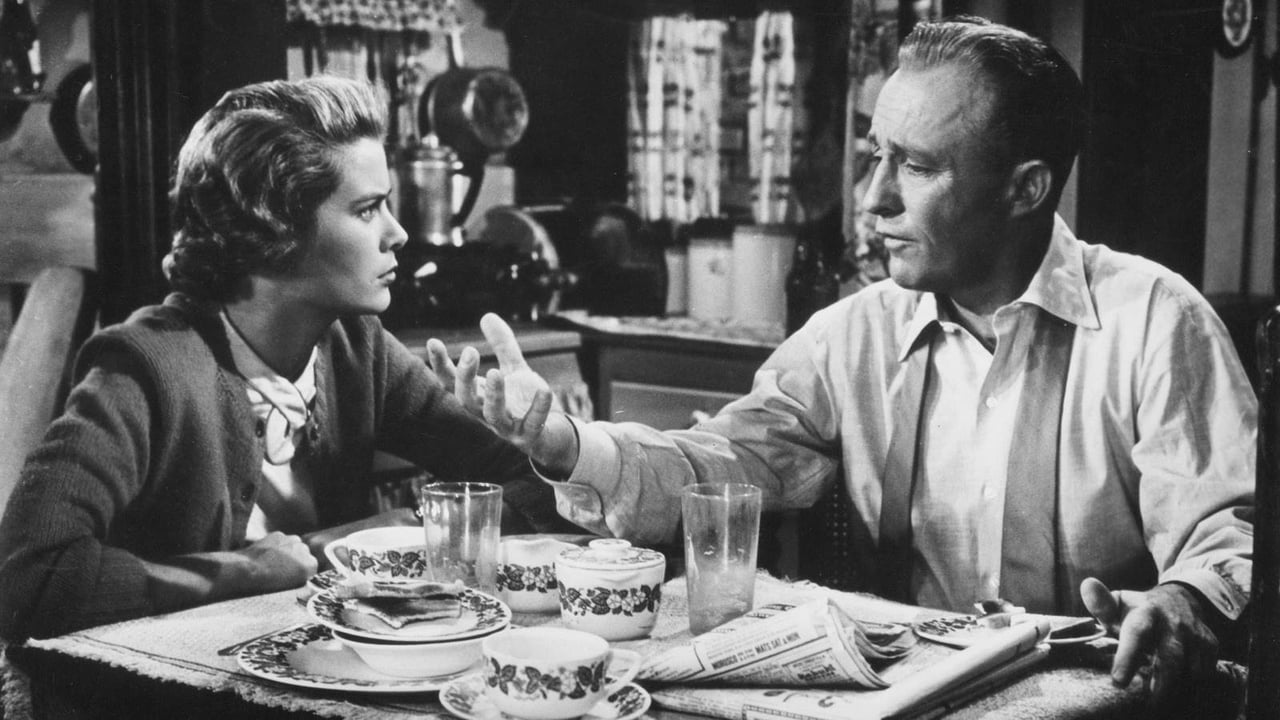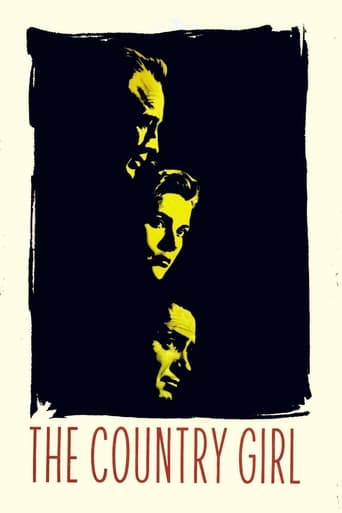

A plain reason why I arouse my interest in this film is the controversy of Grace Kelly's Oscar win over Judy Garland in A STAR IS BORN (1954), according to trivia report, a narrow 6 votes altered the result for the jinxed Ms. Garland, who had the best shot in her entire lifetime. But on the other hands 1954 is the prosperous year for Ms. Kelly, with cinema chef-d'oeuvres like REAR WINDOW, DIAL M FOR MURDER, her final victory is quite plausible, just imagine if the prolifically marvelous Jessica Chastain had won over her co-star Octavia Spencer for THE HELP (2011) this year, I doubt there would be a big fuss about it. The film is an adaption of Clifford Odets' most famous play, about a drunkard singer-actor's revival of his plummeting career against his insecurity and impotence for responsibility after a wretched family tragedy. Judging by the title, his wife, a devoted, morally dignified woman, is the linchpin, a paragon wife, undergoes all her tribulation from her husband and at last procures the affection of another man, a divorced director in the Broadway coterie. The 3-triangle team is the backbone of the film, this is my first film starring Bing Crosby, who has a showier role than his co-star Holden, Crosby manifests his talent in dramas, but his role has been overshadowed by Holden and Kelly's showdown, thanks to the self-degrading makeup skill, Grace Kelly sacrifices her beauty and morphs into a woman under the family trauma but still holds steady of her self-respect, William Holden's double-chin hasn't stopped him from being a complete charmer during the sex battle despite of the ambiguous mutual attraction stunt is a turn-off. PS. I'm no stylist, but Bing Crosby's high waist pants are torturing my eyes when they constantly pop up on the screen, I may not be a fashion follower, but this instance speaks for itself of the importance of not looking ludicrous on the celluloid. Likewise, the film has a setback to be digested by a modernized audience, and by far Judy Garland has still been my win in the race.
... View MoreYears ago, Frank Elgin (Bing Crosby) was a successful singer and actor, but a tragedy turned him in to an alcoholic loser and his wife, Georgie (Grace Kelly), into a bitter shrew. A young Broadway director (William Holden) wants Frank to star in his new show, but Frank's drinking and his uncooperative wife may spell disaster. This stark and touching drama has both Bing and Grace playing against type and they're both wonderful. Bing plays the weak has-been with utter sincerity and Grace drabs it up to play the nagging wife. She won Best Actress and he was nominated for Best Actor. The two reunited two years later in "High Society," playing carefree socialites, showing their versatility. William Holden is excellent as the demanding director who pulls a good performance out of Frank and shakes up the angry Georgie. The script draws on the themes of guilt, alcoholism, and redemption and the black and white photography emphasizes Frank and Georgie's misery. It's a very good and thought-provoking film.
... View MoreWell, it won Grace Kelly an Academy Award and it's easy to see why. She was delicious in a couple of earlier movies and positively supernal in "Rear Window." Here, too, she's playing against type -- not the glamorous, elegant blond but the beaten-down mousy wife in glasses, holding up her enfeebled alcoholic husband, Bing Crosby. But was she really actress enough for such a melodramatic role? Yes and no. She does okay, slumping her drab way through the role, radiating exhaustion. But when it comes to angry shouting she seems uncomfortable, as if in violation of the rules of the convent school in which she'd been educated.I don't know if that can be held against her. This is from a play by Clifford Odets and so all of the lines sound as if they were written for the stage. Nobody else sound especially natural either. Her worst moment is her most intense -- when the director, William Holden, who's trying to resurrect Crosby's career chews her out, blaming her for all of Crosby's weaknesses. She turns and slaps Holden hard across the face, then says with what intensity she can gather, "Did I forget to tell you I was proud?" That's pretty pompous stuff.With regard to that scene, it's a good illustration of the mediocre and middle-brow talent of the film's director, George Seaton. The pauses after the slap and after the devastating line are long. Very long. The camera lingers on the two figures in medium shot, waiting, one supposes, for the gasps to die down in the audience. You know, a good, efficient director of Grade B movies, which this is, at heart, would have given the audience credit enough to understand this is an important incident and would have edited his way quickly through it. Sam Fuller, nobody's idea of a self-important artist, would have introduced somehow a touch of irony.But director Seaton more or less stumbles through this stagy plot and exercises no discernible imagination in his staging. He's also responsible for the screenplay, which turns far too much time over to Bing Crosby singing vapid songs and cuts out what was one of the most important events in the play -- the scene in which the Holden character provokes the Crosby character into improvising a stunning angry speech in front of the producers. The power of that improvisation leaves the producers speechless and secures the job for Crosby.I remember that scene because many years ago I played Larry the Stage Manager in a college production of "The Country Girl." I was a far better Larry the Stage Manager than Gene Reynolds, who plays Larry the Stage Manager in the movie. I can prove I was better. I even got a fan letter. True, the letter was written by my girl friend, and, true, I had to threaten to pull her hair to get her to write it. But I'm morally certain when she thought about it later, she realized her accolade was justified. It's not a terrible movie, but it's not what it might have been. Holden is constantly on the edge of exploding. Crosby's performance belongs in a movie with Dorothy Lamour. And Kelly's exhaustion is exhausting. Most of the flaws I attribute to the director.
... View MoreI didn't like this movie when my mother drug me too it in 1954, but thought as an adult it might have some reason to watch it. Wrong, my feelings as a 14 year old were correct. If they made a list of the top ten most over rated, over praised films, this would make the list.The subject of co-dependency may have been break thru in 1954, but no longer has much appeal, in fact is ho-hum today.A cliché story line, is burdened with a forlorn Bing, an amateurish Grace Kelly and William Holden, who stoically endures it all. Bing can't act his way out of a paper bag, much less a bottle. At best type casting, and sadly no notable songs for one of the best crooners of the day to showcase his real talents. I hate lip syncing, and can not understand why someone with as much experience singing live as Bing had, must be reduced to this format.To give Grace Kelly an Oscar, instead of Judy Garland, was my first realization that talent and a fine performance sometimes do not determine who wins. The pace of the film is fine. I don't like cut to black editing, but otherwise the film is technically sound.Stage plays, other than musicals, don't often transfer to the screen well, and this is no exception. Someone describe 'Country Girl' as a forgotten classic. There's a reason for this. At least no one has remade this one.Unless you are a fan of the 3 stars, skip this one
... View More